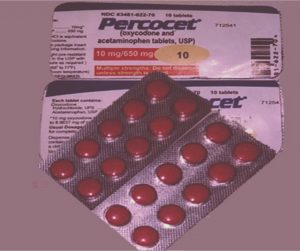Navigation:
[vc_row][vc_column][vc_cta h2="Help Is Only A Phone Call Away" txt_align="center" shape="round" style="flat" color="vista-blue" el_width="sm" use_custom_fonts_h2="true" use_custom_fonts_h4="true"]Call Now 855-227-9535[/vc_cta] People who are unfamiliar with Percocet will often ask: what does it do? And there are quite a few ways to answer that question, knowing that this prescription medication isn’t as widely known as other opioids. Today we are going to talk about Percocet: its medical uses and the effects of abusing such a drug. What makes this substance interesting is the fact that it can be either helpful or dangerous, depending on how you use it. Use it right and you can experience its benefits and become healthier. Misuse it and you can easily get addicted. So in that way, it’s very similar to a lot of prescription opioids. Let’s take a closer look.What Does Percocet Do: Medical Uses and Benefits
 Understanding the medical uses of Percocet involves learning what it is. It is a prescription opioid, meaning it’s a painkiller. It is typically given to patients who are suffering from moderate to severe pain. Percocet is a combination drug that contains two main active ingredients: oxycodone and acetaminophen. Oxycodone is an opioid. Acetaminophen is included in order to boost the pain relieving effects of oxycodone. The resulting combination drug is a fast-acting narcotic that provides immediate relief within minutes of use. It works by binding certain receptors in the brain and blocking incoming pain signals. Unfortunately, some people misuse Percocet because it also produces a euphoric high. It makes people feel good. That’s why recreational users will crush the pill and snort it for immediate effects (even if the drug is already fast-acting by design). They will take large doses of it. This puts them at risk of Percocet’s many side effects.
Understanding the medical uses of Percocet involves learning what it is. It is a prescription opioid, meaning it’s a painkiller. It is typically given to patients who are suffering from moderate to severe pain. Percocet is a combination drug that contains two main active ingredients: oxycodone and acetaminophen. Oxycodone is an opioid. Acetaminophen is included in order to boost the pain relieving effects of oxycodone. The resulting combination drug is a fast-acting narcotic that provides immediate relief within minutes of use. It works by binding certain receptors in the brain and blocking incoming pain signals. Unfortunately, some people misuse Percocet because it also produces a euphoric high. It makes people feel good. That’s why recreational users will crush the pill and snort it for immediate effects (even if the drug is already fast-acting by design). They will take large doses of it. This puts them at risk of Percocet’s many side effects.
Drug Abuse
Abused, Percocet can be just like any other opioid and cause its users to develop tolerance, physical dependence and addiction. Abusing it can cause various short term effects, depending on the person’s drug habits. They may experience headaches, fatigue, confusion, constipation, nausea, vomiting, dry mouth, and respiratory depression. The last one is particularly dangerous.Addiction and Dependence
Long term abuse can lead to addiction, also known as the obsessive need to take the drug, even when you’re already suffering its adverse effects. A person who is dependent on Percocet will no longer be able to function normally without it. That’s because their body has grown used to the drug’s presence. Long term effects of abuse may include liver toxicity, severe constipation, kidney failure, overdose, and even death. This drug can cause severe withdrawal symptoms like chills, seizures, anxiety, panic attacks, fevers, and muscle pain. [maxbutton id="3" ] If you know someone who is abusing their prescription drugs, whether it’s Percocet or another narcotic, look for a drug rehab facility near you. They may be able to get better with the help of medical professionals. A combination of drug detox and behavioral therapy may be necessary to treat all effects of addiction. It’s the safest way to quit Percocet. Drug abuse is still a problem in the United States, and in most other parts of the world. But recovery is possible if you take a proactive approach and with the help of rehab services.
The previous article Percocet: What Does it Do? See more on: RehabNear.me
from
https://www.rehabnear.me/what-does-percocet-do/

No comments:
Post a Comment